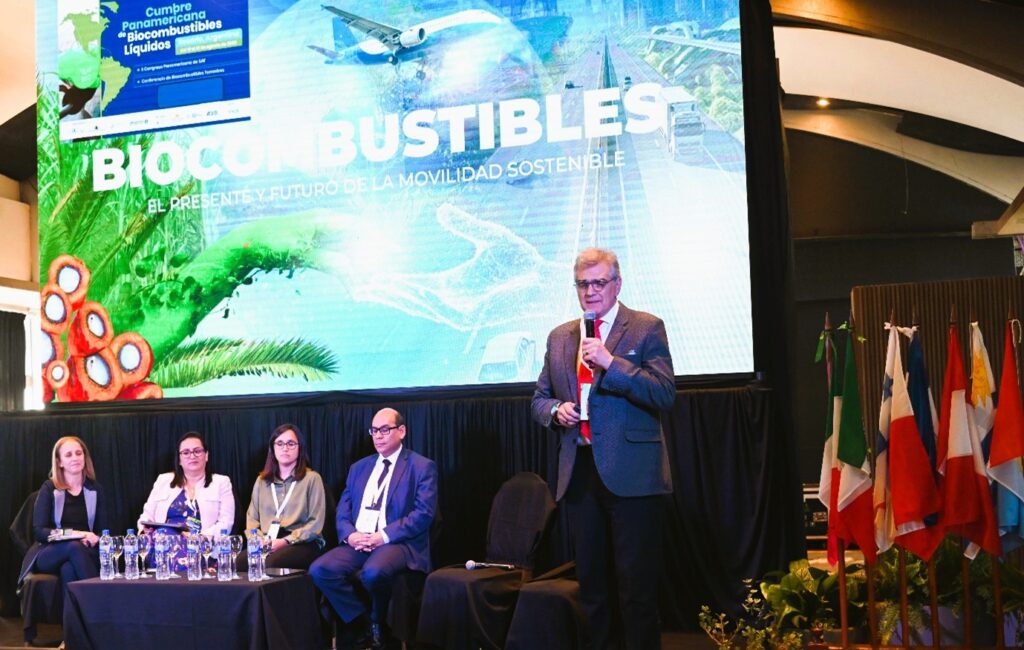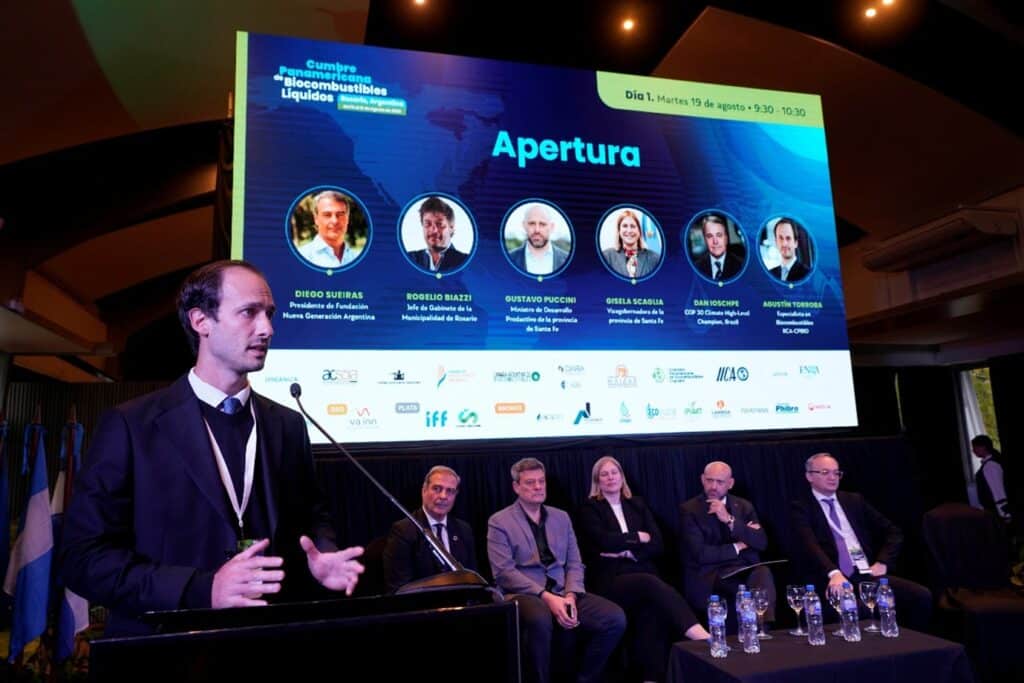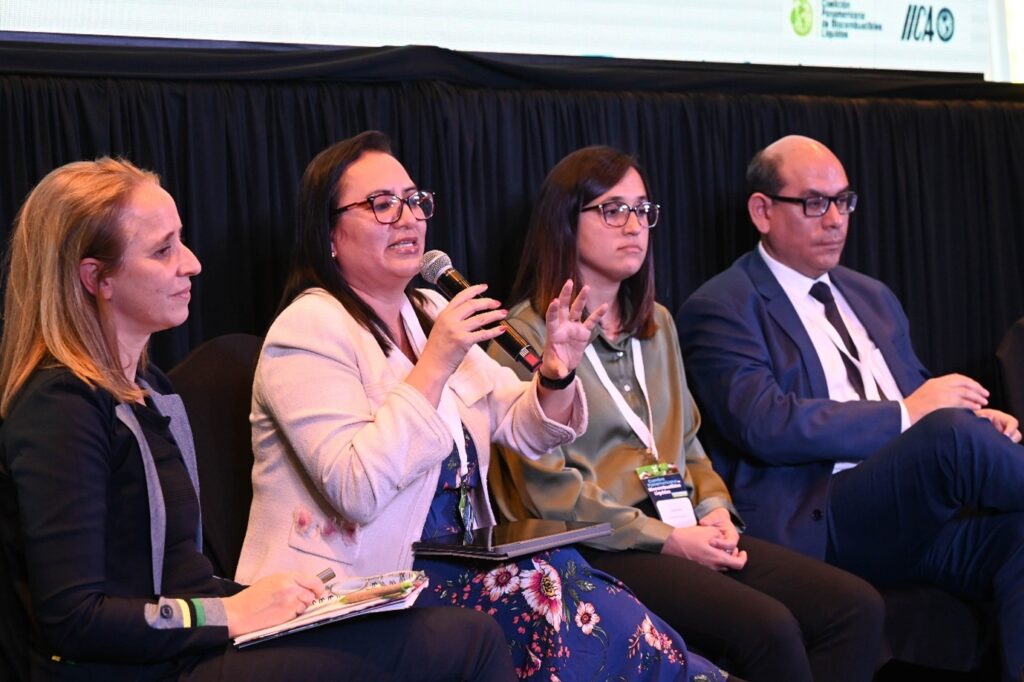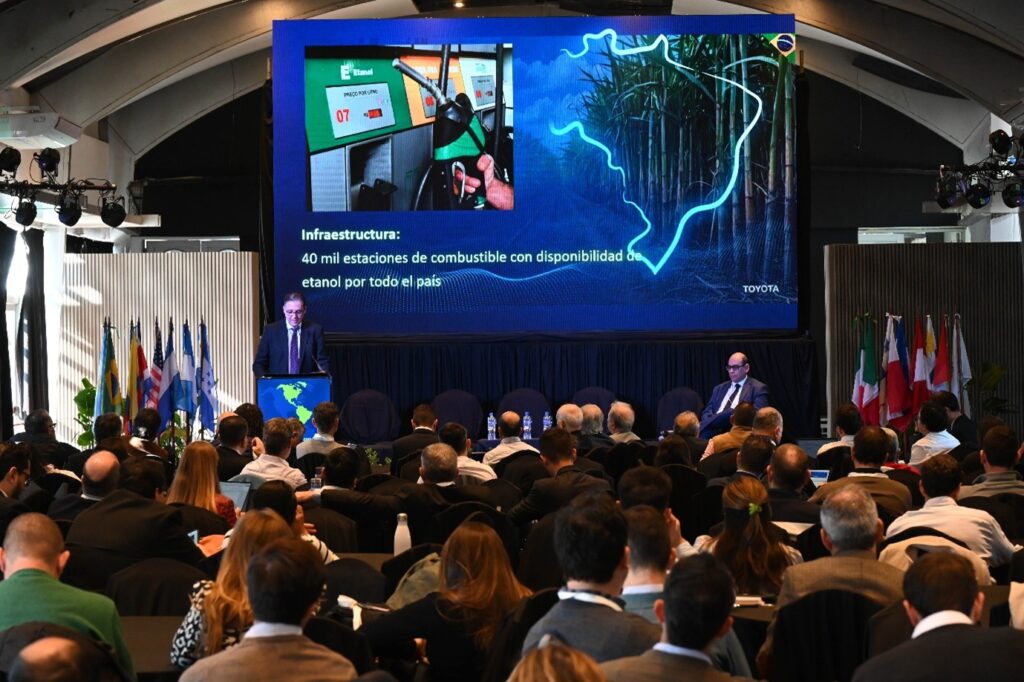
Carlos Mateus of the Biofuel Federation of Colombia moderated the panel on SAF policies and regulations in Latin America.
Rosario, Argentina, 26 August 2025 (IICA) – The Pan American Liquid Biofuels Summit was held in the Argentine city of Rosario within the framework of Climate Week. The international meeting, aimed at defining the agenda and future of liquid biofuels in the Americas, sought to define joint strategies to strengthen biofuel production in the region and advance towards a more sustainable energy matrix.
The opening session, which highlighted investments in the region, was carried out in Salón Terrazas de La Fluvial with the participation of the Deputy Governor of Santa Fe, Gisela Scaglia; the Minister of Productive Development, Gustavo Puccini; the Secretary of Energy of Santa Fe, Verónica Geese; and the President of Fundación Nueva Generación Argentina (FNGA), Diego Sueiras.
Also in attendance were Rogelio Biazzi, Head of the Municipal Cabinet; Gustavo Idígoras, President of the Oil Industry Chamber and the Grain Exporters Center (CIARA-CEC); and Agustín Torroba, International Biofuel Expert of the Inter-American Institute for Agricultural Cooperation (IICA) and Executive Secretary of the Pan-American Liquid Biofuels Coalition (CPBIO).
The event included the participation of companies and sectors from Colombia, Costa Rica, Paraguay, Uruguay, Brazil, Argentina, Chile, Guatemala, Mexico and the United States, which promoted the adoption of active policies and open biofuel markets, with only mandatory cuts.
II Pan American SAF Summit
More than 25 associations and business entities that promote biofuels in the Americas participated in the two-day Pan American Liquid Biofuels Summit.
The Summit was divided into two parts. The first was the II Pan-American Summit on Sustainable Aviation Fuels (SAF), which gave continuity to the dialogue that was initiated last year during the first edition of the summit in Bogotá.
The second summit began with a keynote speech on the HEFA Technology Roadmap by Silvana Cuevas, Technology Licensing Manager at TOPSOE, who stressed that the future of the energy transition in the aviation industry is in the hands of many, including raw material and fuel producers.
“We at TOPSOE contribute our experience and technologies to support you in this process. This summit affords an opportunity to engage in necessary communication”, added Cuevas.

Agustín Torroba (IICA-CPBIO), during the opening session of the summit.
Gustavo Idígoras, who moderated the panel on the SAF value chain, highlighted the importance of intensive meetings with the civil aviation industry: “We participated in meetings with international companies such as Latam, Embraer and ICAO authorities, given that the future of liquid biofuels—both vegetable oil as well as corn and sugarcane—is to supply sustainable aviation fuels for the coming years, and the Argentine industry has tremendous potential to capitalize on this opportunity”.
“Thanks to the quality of the conferences, panelists and attendees at the II Pan-American SAF Summit, we were able to update our knowledge in all areas, such as regulations and public policies, available technologies, raw materials, certification, current and potential markets for SAF, and what’s next for sustainable marine fuels (SMF), which is just around the corner”, said Carlos Mateus of the Colombian Biofuels Federation, who moderated the panel on SAF policies and regulations in Latin America.
“There is still important work to be done in terms of coordination and support for the Coalition’s task force and in developing regional proposals for COP30 in Brazil and for the 42nd Assembly of the International Civil Aviation Organization (ICAO), which are important short-term commitments with implications for the viability and sustainability of our industries”, added Mateus.
“The keynote presentations and panels at the Summit provided a broad overview of the state of affairs and challenges in relation to SAF and biofuels, particularly political and institutional frameworks, technical and economic aspects, and, of course, their fundamental contributions to reducing greenhouse gas emissions. Cultivated energy is the way forward”, remarked Jorge Feijoo of the Argentine Sugar Center, who moderated the keynote presentation “Food vs. Fuel: SAF and Biofuel Production”.

Aida Lorenzo, of the Guatemalan Renewable Fuels Association, during the presentation by the CPBIO technical group.
Terrestrial Biofuels Conference
The Terrestrial Biofuels Conference took place on the second day of the Summit. The CPBIO technical group delivered a presentation on sustainability and carbon footprint during the panel.
“The region must take advantage of its comparative advantage, namely its wealth of biomass, which it can transform into a competitive advantage by generating biofuels to decarbonize the environment”, said Carlos Castro, of PerúCaña, one of the participants in the CPBIO technical group.
“This summit has allowed for highlighting the role of biofuels in decarbonizing land and air transport. Without a doubt, the Pan-American region plays an important role in helping to mitigate climate change and continuing to provide the rest of the world with these renewable fuels”, explained Aida Lorenzo of the Guatemalan Renewable Fuels Association, who moderated the keynote speech “SAF Policy in the EU: REFUEL”.
Andrea Veríssimo, of Brazil’s Corn Ethanol Union (UNEM), applauded the organization of the event, which was attended by diplomats, businesspeople and representatives from various associations, and attracted considerable public interest.
“An important outcome is the increased interaction between agents from different countries and the possibility of cooperation, through the sharing of data, ideas and examples of public policies”, added Veríssimo.

Roberto Braun, of Toyota, described how Brazil’s vast ethanol supply infrastructure is facilitating the expansion of its flexible-fuel vehicles.
According to Patrick Adam, President of Argentina’s Corn Bioethanol Chamber, it has been clearly demonstrated that biofuels afford an immediate and competitive solution to achieve a successful energy transition in countries with a considerable wealth of biomass, such as those in the region.
“Beyond reducing greenhouse gas emissions (GHG), biofuels have a major impact on federal development: they strengthen agriculture, generate quality employment and add value at the source. The region is consolidating its position as a biofuel powerhouse for land, air and sea transport”, noted Adam.
Luis Fernando Salazar, of the Association of Latin American Sugar Producers (UNALA), mentioned that it is very important for the Latin American sugar agroindustry to be able to take part in these types of events. He considered that they allow for sharing best practices, both in the sector and in other countries in the region, and for learning about practices implemented in countries that are more advanced in biofuels (such as Brazil and Argentina), so that they may be replicated in countries that still lack mandatory ethanol blending mandates.
Consolidating a Pan-American biofuel sector
The Summit was a resounding success, given that it allowed for further consolidating hemispheric ties in the fuel sector and facilitated the sharing of experiences and knowledge among all countries and participants in the field, including representatives from the public and private sectors, government officials, producers, associations, unions, universities and the CPBIO youth group known as “Champions”.
“Thanks to the Summit in Rosario, a Pan-American biofuel sector was consolidated and a clear agenda was established, which will enable us to continue promoting biofuels with greater commitment”, concluded Mateus.
More information:
Institutional Communication Division











